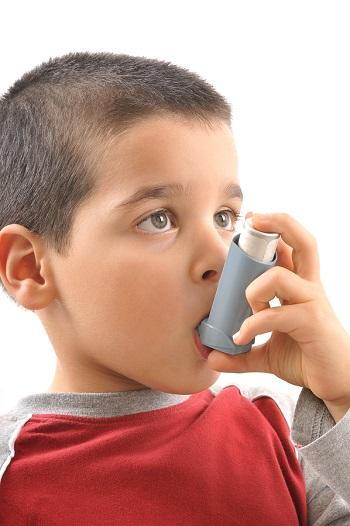You might be surprised to hear that asthma is one of the most common chronic disorders affecting children in the US. Asthma is a condition in which the airways constrict and become inflamed, making it difficult for your little one to breathe. This long-term disease can be so bad at times that your child may miss multiple school days as a result. No matter whether you suspect that your child might have asthma or they’ve already been diagnosed, it’s important that you know how to properly manage asthma symptoms to reduce the frequency and severity of flare-ups.

Children who have asthma often experience bouts in which it’s difficult to breathe. They might wheeze or cough or find it hard to catch their breath. The more inflamed and irritated the airways get the harder it will be for your child to breathe. To reduce these symptoms and get them under control a pediatrician may recommend different types of medications.
One medication is known as an inhaler. The medication sits within a plastic container that contains a mouthpiece. When you push down on the top of the container the medication sprays into the back of the throat to help open up the airways. This is a fast-acting medication that is only used with the onset of an asthma attack. This medication isn’t used as a daily medication but only on an as-needed basis. The inhaler is designed to relax the constricted muscles within the throat to help relieve symptoms right away and to prevent your little one from needing to take a trip to the hospital.
Of course, the goal of asthma treatment is to stop the attack from happening in the first place. These attacks can be scary and unnerving for both you and your child, so any way in which we can lessen asthma attacks is vital. This also means figuring out what factors can set off your child’s asthma. Pinpointing triggers such as cigarette smoke, a family pet or cold air is important for not just avoiding these factors whenever possible but also figuring out ways to cope and reduce symptoms when your child does come in contact with these triggers.
Along with having a rescue inhaler, your child will also have a controller medication that they will take every day. This inhaler medication is designed to reduce your body’s response to these triggers. It’s important that your child take this medication every day, as prescribed by their doctor. Even if your child isn’t experiencing asthma attacks it is important that they still take this medication.
We know that using these medications properly can be confusing, especially in the beginning. Remember that this is why you have a pediatric team by your side. Call your pediatrician anytime you have questions or concerns about your child’s asthma or asthma medication.
